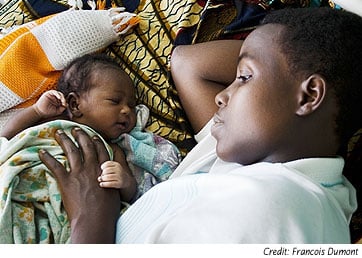
 (WOMENSENEWS)–While working in remote Papua New Guinea last year with Doctors Without Borders/Medecins Sans Frontieres my team and I heard about a woman who’d recently died giving birth to twins. So we immediately left to check up on the newborn children. While there, we came upon another woman who was also in labor and carrying twins. After learning that she’d already had one stillbirth, we transferred her to our hospital.
(WOMENSENEWS)–While working in remote Papua New Guinea last year with Doctors Without Borders/Medecins Sans Frontieres my team and I heard about a woman who’d recently died giving birth to twins. So we immediately left to check up on the newborn children. While there, we came upon another woman who was also in labor and carrying twins. After learning that she’d already had one stillbirth, we transferred her to our hospital.
After a difficult and protracted delivery, two healthy baby boys arrived safely. Then what should have been a remarkable moment turned into a medical emergency. Because there is a higher risk of bleeding after the delivery of twins, the young mother started to hemorrhage and lost over a quart of blood.
We managed to control her bleeding with intravenous fluids and drugs. But without this medical care, this woman would have lost a lot more blood and might not have survived.
As a midwife, I have witnessed firsthand the immense challenges women face and have had the privilege of providing care in places such as Sudan’s Darfur, Madagascar, Sri Lanka and Papua New Guinea. After seeing the direct benefits of emergency obstetric care, I grieve for all the women around the world who aren’t getting it. In most developing countries access to health care is limited and few women get the emergency assistance they need during pregnancy and at the time of birth.
A Life Saved, Lost
In Papua New Guinea that day, one woman’s life was saved while another’s was lost–the difference being that the second woman had practical medical solutions available to her.
On this Mother’s Day, let’s remember that 1,000 women still tragically die every day in childbirth or from pregnancy-related complications that are preventable with skilled clinicians, drugs and equipment. Maternal death is an ongoing crisis, but it is an avoidable crisis and it deserves our attention.
To make an immediate difference, the focus has to be on the main causes: hemorrhage, infection, unsafe abortion, hypertensive disorders and obstructed labor. These account for over 80 percent of all maternal deaths globally. In our emergency obstetric units, we can provide care for these complications in a range of high-risk settings.
In the countries where Doctors Without Borders works, in places like South Sudan, Haiti, or Pakistan, our expectations are relatively simple: concretely reduce the number of deaths we see in our clinics and hospitals by addressing the immediate needs of pregnant women in crisis situations. The medical approaches we use have been available for a long time, and it is abundantly clear from our experience in the field that maternal deaths can be averted.
Fifteen percent of all pregnant women encounter life-threatening complications during delivery, whether they are in New York, Los Angeles, Haiti’s Port-au-Prince or Mogadishu, Somalia.
Increased Vulnerability
Women who are subject to conflict, health crises and displacement are rendered even more vulnerable. Complications for those living in a war zone are likely to be even higher when health facilities collapse.
Medical care and available resources are the key factors during these times of crisis. Time and again, we see that having access to emergency obstetric care will make the difference no matter where pregnant women are. Whether she is fleeing conflict, surviving in a refugee camp or living under plastic sheeting after her home was destroyed by an earthquake, a pregnant woman who experiences complications in childbirth needs skilled staff, drugs and equipment. This will save her life and that of her baby, as it did for the woman we assisted in Papua New Guinea.
Access to quality health care for all pregnant women may seem an impossible dream, but it can be achieved. While Doctors Without Borders, as an emergency medical organization, is focusing on providing drugs, equipment and trained medical staff, it’s the role of governments and development-focused agencies to take action on the issues of women’s rights, education for girls and the improvement of health systems that are paramount in reducing maternal mortality in the long term.
Would you like to Comment but not sure how? Visit our help page at https://womensenews.org/help-making-comments-womens-enews-stories.
Would you like to Send Along a Link of This Story?
https://womensenews.org/story/reproductive-health/120509/save-mothers-lets-lower-5-basic-risks
Kara Blackburn, from Brisbane, Australia, is a registered nurse/midwife who joined Doctors Without Borders in 2006. She has practiced midwifery for 14 years. In her current role as medical advisor for women’s health, based in Sydney, Blackburn supports a number of Doctors Without Borders women’s health projects globally.


